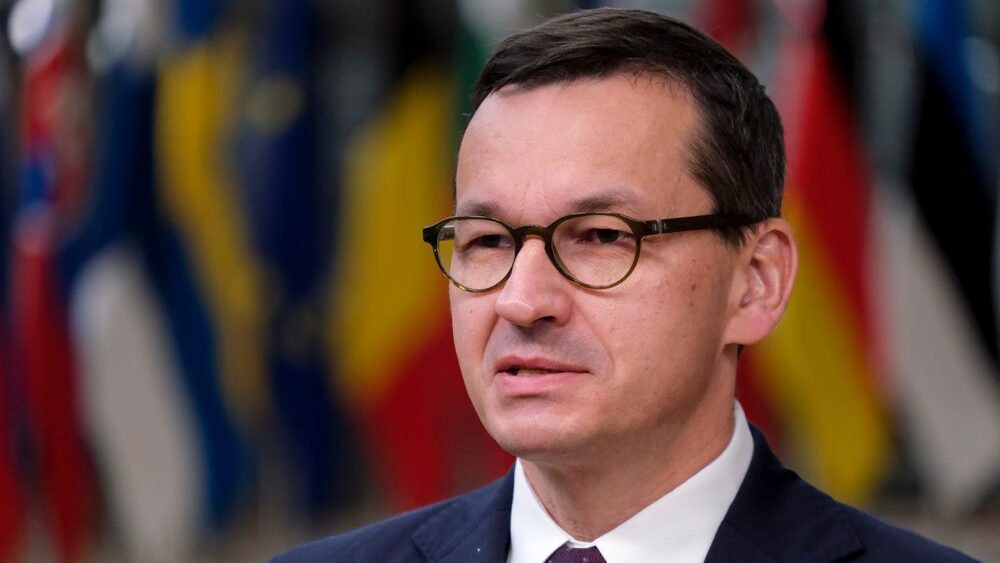
Mateusz Morawiecki
Photo: Alexandros Michailidis / Shutterstock.com
Poland’s recently unseated Prime Minister Mateusz Morawiecki endorsed Hungarian Fidesz’s entry to the European Conservative and Reformist (ECR) group Wednesday, ahead of this week’s European Council meeting. He added that a recently leaked report on EU plans to sabotage the Hungarian economy marked a dangerous precedent for European democracy.
Morawiecki made the comments at a press conference alongside ECR’s co-chair Professor Ryszard Antoni Legutko, saying that he was “open to Fidesz joining the ECR group” after the 2024 European election— but that ultimately such a decision was the prerogative of Fidesz itself.
The endorsement comes amid mounting pressure and institutional harassment towards Budapest. There is growing speculation that the EU and other member states could even evoke emergency Article 7 procedures to strip Hungary of its European voting rights.
Serving as Polish PM until December, and regarded as a leading figure within the Law and Justice (PiS) party, Morawiecki’s de facto endorsement is the strongest sign yet of the party’s impending approval for Fidesz’s entrance to the ECR group despite a strain in relations following Russia’s invasion of Ukraine, where PiS has taken a hawkish stance on the war.
The ECR group is the primary conservative faction within the European Parliament, consisting of parties such as Meloni’s Fratelli d’Italia and Morawiecki’s PiS. Polls suggest the ECR is expected to make historic electoral gains this year, to the point of breaking the centrist EPP’s alliance with the Greens and the Left.
Fidesz left the EPP in 2021. The dozen or so MEP seats the party is likely to command after this year’s European elections would be a major bargaining chip for the ECR group.
While Hungary’s line on Ukraine has strongly diverged from more Atlanticist and anti-Russian factions within the ECR—including the Polish PiS delegation—ECR MEPs have been noticeably conciliatory towards Fidesz amid ongoing rule-of-law harassment proceedings.
Despite Morawiecki’s endorsement, Fidesz’s relative dovishness towards Russia may anger more pro-NATO parties within ECR as both Hungary and Turkey continue to block Swedish NATO membership. At the heart of these issues is the desire of some member states to exercise national sovereignty at the expense of an EU characterised as an “ever-closer union.”
This is not the first indication that PiS would be amenable to a Fidesz application to the ECR. Both Morawiecki and Hungarian PM Viktor Orbán made overtures to form a right-wing political alliance in 2021, alongside Italian populist Matteo Salvini
During the conference, Morawiecki went on to reference this week’s leak to the Financial Times about an alleged plot by Eurocrats to derail the Hungarian economy as a clear “attempt to blackmail” a sovereign nation.
All signs point to a looming bust-up between Budapest and Brussels ahead of Thursday’s special European Council meeting. Morawiecki reflected on his recent time in government by saying the EU’s concept of rule of law “dramatically differs” depending on the ideology of the ruling party in Warsaw.
Polish democracy has been taken to the brink since last October’s elections, where Morawiecki’s PiS ceded power to a pro-European coalition of liberals led by former EU Council President Donald Tusk.
Under the new Tusk government, so-called liberals initiated an intense purge of public institutions including the national broadcaster, with PiS and conservatives across Europe decrying the EU’s total lack of condemnation, in contrast to their frequent and repetitive haranguing Poland over ‘rule-of-law’ concerns.
After eight years of conservative rule, Poland’s rapid flip to the left has unsettled right-wing politics in Europe. Indicating the direction of travel was a senior Tusk minister who promised to support the controversial EU Migration Pact at this week’s Council summit.
A political standoff over the construction of an airport, allegedly sabotaged by Tusk to appease German strategic interests, is just the latest episode in ongoing gridlock. Polish President Andrzej Duda has threatened snap elections following the dramatic arrest of two conservative lawmakers on the grounds of the presidential palace.
Fidesz’s 12 MEPs currently sit unaligned in the European Parliament. The party holds 47% of public support following a solid victory in the 2022 parliamentary elections in Hungary.
